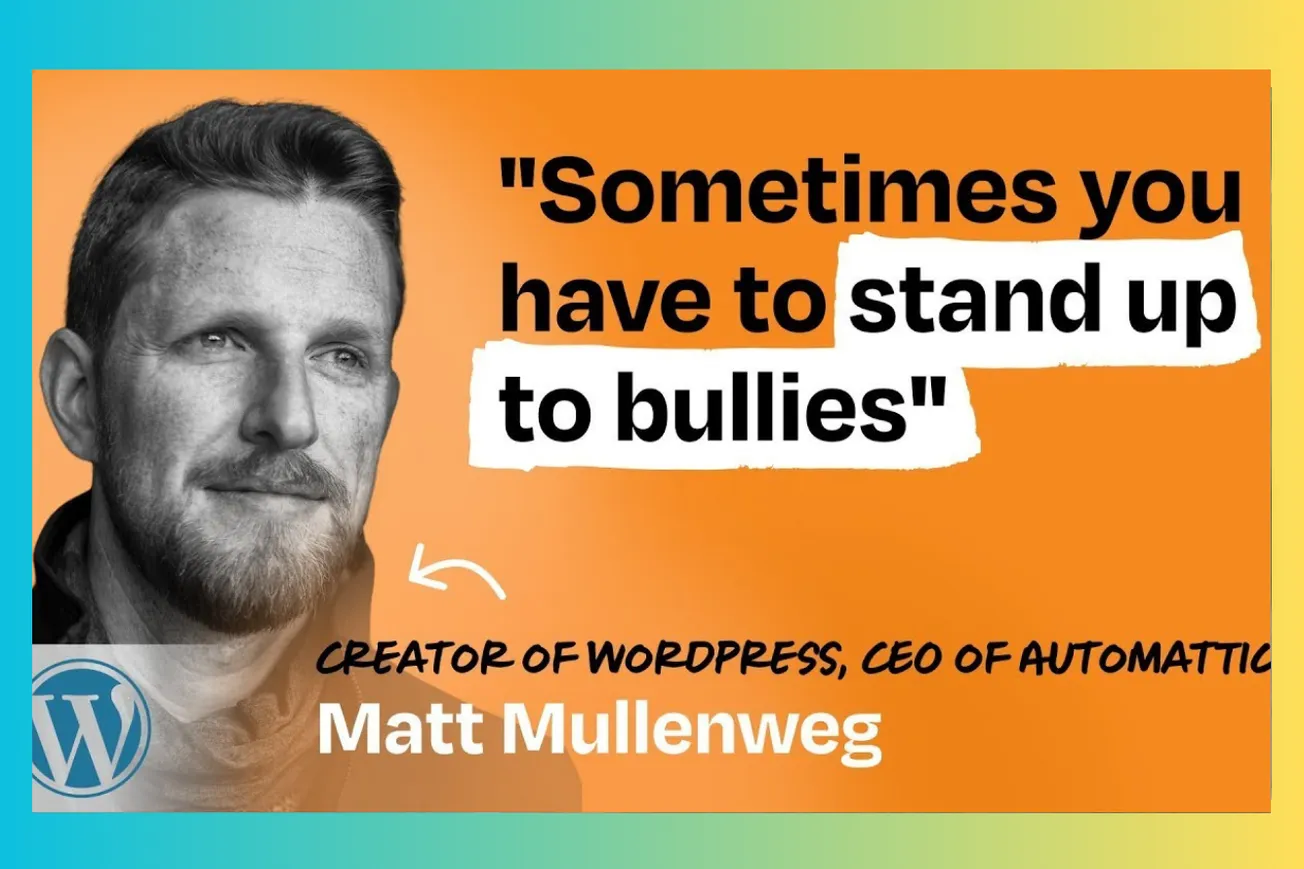Table of Contents
WordPress co-founder Matt Mullenweg addresses the WP Engine controversy head-on, explains why Meta's Llama isn't truly open source, and shares his vision for democratizing publishing in this comprehensive discussion.
The co-creator of WordPress, which powers 43% of all websites globally, sits down to discuss the most contentious period in his 20+ year open source journey and why protecting open source ideals sometimes requires taking a stand.
Key Takeaways
- WordPress powers over 40% of all websites globally, 10x more than its nearest competitor Shopify at 4%
- True open source requires four fundamental freedoms: use, study, modify, and redistribute without restrictions
- Meta's Llama contains usage restrictions above 750 million users, making it "fake open source" despite marketing claims
- The WP Engine conflict centers on trademark abuse, reduced contributions, and feature limitations that damage WordPress's reputation
- Building successful open source communities requires giving people "something to believe in" beyond just utility
- Private equity acquisition of open source companies often leads to cost-cutting that undermines community contributions
- Automatic generates approximately $500 million annually, with WooCommerce representing the majority of revenue
- Community governance works better with visionary leadership than committee-based decision making for maintaining long-term relevance
Timeline Overview
- 00:00–11:15 — Introduction and Career Overview: Matt's journey from broke Houston kid to co-founding WordPress at 19, building Automattic into a $7 billion company with 1,700 employees across 90 countries
- 11:15–17:28 — Bay Lights Project and Philanthropy: How Matt mortgaged his condo to fund San Francisco's iconic Bay Bridge art installation and his philosophy on "radical public art" for community uplift
- 17:28–27:14 — Open Source Philosophy and Origins: The foundational economics and jazz influences that shaped Matt's worldview, plus the four freedoms of GPL licensing and why open source represents the most important idea of our generation
- 27:14–39:12 — AI, Fake Open Source, and Community Building: Why Meta's Llama fails open source standards, how AI models benefit from training on open source code, and lessons for building successful online communities through movements not just products
- 39:12–55:29 — The WP Engine Controversy Explained: Detailed breakdown of the conflict including trademark abuse, private equity impact, reduced community contributions, and the decision to take a public stand
- 55:29–01:11:15 — Addressing Criticism and Community Concerns: Matt's response to being seen as "the bad guy," handling negative sentiment across social platforms, and explaining complex trademark ownership structures
- 01:11:15–01:24:25 — Tumblr Acquisition and Social Media Strategy: The $3 million Tumblr acquisition story, migration challenges, and creating sustainable alternatives to advertising-driven social networks
- 01:24:25–01:28:51 — Automattic's Acquisition Philosophy: Investment criteria focusing on acceleration over turnarounds, maintaining founder relationships, and building a "Berkshire Hathaway for open source"
The Open Source Philosophy That Drives Everything
Matt Mullenweg's approach to technology stems from a philosophical foundation rooted in economics and jazz collaboration. Growing up as a "broke kid in Houston," he discovered open source through necessity—building websites for local musicians in exchange for music lessons. This early exposure to collaborative creation shaped his understanding that open source represents "the most important idea of our generation."
The GPL license governing WordPress enshrines four fundamental freedoms that Mullenweg considers essential for digital liberty. Users must have the freedom to use software for any purpose, study how it works by examining source code, modify it according to their needs, and redistribute those changes while preserving the same freedoms for others. This "viral" aspect of GPL licensing ensures that improvements to open source software remain accessible to the entire community.
Mullenweg draws explicit parallels between open source principles and democratic governance, arguing that "if the Founding Fathers were around today, they'd be open source advocates." As software increasingly controls daily life, he believes fundamental freedoms attached to that software become essential for maintaining human liberty. This philosophy drives his willingness to engage in controversial battles when he perceives threats to open source ideals.
The compounding effect of open source development creates sustainable competitive advantages that proprietary software cannot match. WordPress benefits from contributions by thousands of developers worldwide, creating a innovation velocity and feature breadth that would be impossible for any single company to achieve. This collaborative model produces more robust, secure, and feature-rich software while distributing the maintenance burden across a global community.
Why Meta's Llama Represents "Fake Open Source"
Despite widespread industry acceptance of Meta's Llama as an open source AI model, Mullenweg identifies a critical flaw that disqualifies it from true open source status. The license contains a restriction requiring permission from Meta for deployments exceeding 750 million monthly active users, violating the fundamental freedom to use software for any purpose without seeking permission.
This limitation creates ambiguity around how to measure usage—whether through registered users, monthly visitors, or other metrics—while establishing Meta as a gatekeeper for successful implementations. Companies building on Llama face uncertainty about future licensing requirements and potential conflicts with Meta's business interests. Such restrictions contradict the core principle that users should never need to ask permission to use open source software.
Meta's insistence on calling Llama "open source" despite these restrictions likely stems from European regulations that treat open source and proprietary AI models differently. This regulatory arbitrage undermines genuine open source projects and confuses developers about licensing standards. Mullenweg emphasizes that Meta has historically been a strong open source contributor with projects like React and PHP improvements, making their licensing stance on Llama particularly puzzling.
The distinction between truly open and "open-washing" becomes crucial as AI models become foundational infrastructure. Developers investing time and resources in Llama face potential future restrictions or licensing changes that could undermine their businesses. True open source AI models provide the security and freedom necessary for building sustainable applications and services.
The WP Engine Conflict: Protecting Community Interests
The dispute with WP Engine crystallizes broader tensions between open source communities and private equity ownership models. After Silver Lake's 2019 acquisition, WP Engine's relationship with the WordPress community deteriorated significantly. The company reduced contributions to core development while increasingly leveraging WordPress trademarks in ways that confused customers about official relationships.
WP Engine's cost-cutting measures included disabling WordPress's revision system, which saves every edit to posts and pages like Wikipedia's edit history. This feature represents one of WordPress's most valuable user safety mechanisms, allowing content creators to undo mistakes and recover lost work. By removing revisions to save database storage costs, WP Engine offered what Mullenweg describes as a "bastardized, hacked-up version" of WordPress while continuing to use the WordPress name.
Survey data revealed that 20-40% of WP Engine customers believed they were officially associated with WordPress.org, indicating successful brand confusion despite the companies' separation. This misrepresentation not only diluted WordPress's trademark but also created support burdens for the WordPress.org team from confused customers seeking assistance with WP Engine-specific issues.
The legal battle escalated when WP Engine filed a multi-million dollar lawsuit against both Mullenweg personally and the WordPress project, hiring Quinn Emanuel, known for handling high-profile corporate litigation. Simultaneously, they launched an expensive public relations campaign designed to frame Mullenweg as an unstable leader threatening the open source ecosystem.
Building Movements Beyond Products
Mullenweg's approach to community building draws heavily from his background in economics and jazz collaboration. Rather than simply creating software, he emphasizes the importance of giving people "something to believe in"—a philosophy and worldview that transcends mere utility. WordPress's tagline "Code is Poetry" exemplifies this approach, elevating software development from purely technical work to creative expression.
The naming convention of WordPress releases after jazz musicians reinforces the cultural identity that binds the community together. These seemingly small touches create emotional connections that sustain long-term engagement and contribution. Community members don't just use WordPress; they participate in a movement with shared values and aesthetic sensibilities.
Platform strategy requires genuine openness rather than the controlled ecosystems favored by many technology companies. WordPress's plugin and theme architecture allows third-party developers to modify every aspect of the software, creating an ecosystem where external developers often generate more revenue than the core platform. This represents "true platform" economics where the ecosystem's success exceeds the platform's direct monetization.
Many proprietary platforms initially encourage third-party development but later restrict or acquire successful applications when they become competitive threats. Facebook, Shopify, and other major platforms have repeatedly "pulled the rug" from under successful developers by changing APIs, restricting access, or demanding equity stakes. Open source platforms cannot engage in such predatory behavior because developers always retain the right to fork the code and continue independently.
Navigating Controversy and Public Perception
The shift in public perception around the WP Engine conflict illustrates the challenges of defending open source principles in complex business environments. Mullenweg acknowledges that his approval ratings dropped from 99% positive to approximately 95-96%, representing a significant increase in vocal critics while maintaining broad community support among active contributors.
Social media platforms amplify controversy through algorithms optimized for engagement rather than truth or nuance. Sentiment analysis revealed striking platform differences: negative comments represented only 8% on LinkedIn, Facebook, and Instagram, but reached 52% on Twitter. This algorithmic bias toward outrage makes it difficult to communicate complex technical and legal issues in short-form content.
The WP Engine legal team's public relations strategy explicitly aimed to damage Mullenweg's reputation through coordinated negative coverage. This "dark PR" approach involves amplifying any historical criticism or controversy while suppressing positive coverage. The strategy parallels tactics used in celebrity reputation management, where manufactured controversies distract from substantive issues.
Longer-form content like podcasts and detailed articles provide better venues for explaining nuanced situations than social media soundbites. Mullenweg's strategy of engaging extensively in interviews and Q&A sessions allows for full context and prevents selective quote manipulation. This approach contrasts with WP Engine's silence and reliance purely on legal representation.
The Tumblr Acquisition: Lessons in Social Media Innovation
Automattic's 2019 acquisition of Tumblr for $3 million represents both the potential and challenges of reviving neglected internet properties. Originally sold to Yahoo for $1.1 billion in 2013, Tumblr pioneered many features now standard across social platforms, including image embedding, multiple post types, and video support. Under Yahoo and subsequent Verizon ownership, the platform languished due to corporate neglect and policy restrictions.
The acquisition included significant liabilities beyond the purchase price, including ongoing FTC investigations, lawsuits, and a team of 185 employees burning substantial cash monthly. Despite these challenges, Tumblr retained a loyal user base of 15-20 million monthly active users, with over half under age 25 and a significant LGBTQ+ community representation.
Tumblr's unique position as an anonymous, creative social platform filled a gap left by Facebook and Instagram's real-name policies. Users could explore different identities and participate in communities without parental oversight or professional concerns. This differentiation became more valuable as other platforms consolidated around similar models and engagement patterns.
The technical integration with WordPress represents one of the largest data migrations in internet history, moving half a billion sites to WordPress infrastructure while maintaining existing APIs and user interfaces. This backend transformation enables Tumblr users to access WordPress's vast plugin and theme ecosystem while preserving the platform's distinctive social features.
Economic Models for Sustainable Social Media
Traditional advertising-driven social media creates perverse incentives that prioritize engagement over user welfare. Platforms optimize for time spent rather than user satisfaction, leading to algorithmic promotion of controversial content that generates strong emotional responses. This model often exacerbates social division and mental health issues while extracting value from user attention.
Tumblr's experimental subscription and first-party advertising models offer alternatives to third-party advertising ecosystems. First-party promotion allows users to boost their own content or products rather than accepting targeted advertisements from unknown entities. This approach maintains user control while providing revenue opportunities for both creators and the platform.
Subscription models align platform incentives with user satisfaction rather than engagement metrics. When users pay directly for services, platforms succeed by providing value rather than capturing attention. This model works particularly well for creative communities where users derive substantial personal or professional benefits from platform participation.
The integration with WooCommerce enables seamless e-commerce functionality for Tumblr creators, allowing direct monetization of creative work without relying on external platforms or payment processors. This vertical integration creates new revenue streams while reducing dependency on advertising models that may conflict with user interests.
Acquisition Strategy: Building the "Berkshire Hathaway of Open Source"
Automattic's acquisition philosophy prioritizes acceleration over turnaround situations, focusing on companies with existing product-market fit and strong founding teams. The Tumblr acquisition represents an exception to this approach, requiring extensive restructuring and team replacement that Mullenweg describes as unlikely to repeat in the near future.
Successful acquisitions like Day One and WooCommerce maintain founding teams and accelerate existing roadmaps rather than imposing dramatic changes. Day One's expansion to Android and web platforms exemplifies how Automattic provides resources and distribution while preserving the product's core identity and vision. WooCommerce's growth from a small South African company to Automattic's primary revenue driver demonstrates the potential for scaling focused products.
The "acquirer of first resort" reputation attracts founders who could remain independent but choose to join Automattic for strategic reasons. This voluntary participation indicates confidence in Automattic's stewardship approach and long-term vision. Maintaining these relationships requires genuine respect for acquired products and their communities rather than extractive optimization.
Different product stages require different management approaches within the holding company structure. WordPress represents mature platform infrastructure, WooCommerce operates in growth phase expansion, while Beeper (the messaging product) returns to early-stage innovation reminiscent of WordPress in 2003. This portfolio approach allows for risk diversification while maintaining entrepreneurial energy across multiple ventures.
Conclusion
Matt Mullenweg's journey from teenage open source contributor to defending a multi-billion dollar ecosystem reveals the ongoing tensions between commercial success and community values in the digital economy. His willingness to engage in public battles over trademark protection and open source principles demonstrates that maintaining technological freedom requires active vigilance rather than passive hope.
The WordPress ecosystem's resilience during controversy validates the strength of genuinely open platforms compared to controlled alternatives. While short-term disruption creates uncertainty, the fundamental value proposition of open source software—freedom, community innovation, and protection from vendor lock-in—continues attracting developers and users seeking sustainable technological foundations.
The broader implications extend beyond WordPress to all open source projects facing similar pressures from private equity acquisition and commercialization. Success requires balancing community interests with business viability while maintaining the philosophical commitments that originally drove adoption and contribution.
Practical Implications
- Open Source Strategy: Evaluate AI models and development tools based on true licensing freedom rather than marketing claims about openness
- Platform Selection: Choose development platforms with genuine open source licenses to avoid vendor lock-in and future licensing restrictions
- Community Investment: Focus on building movements with shared values rather than just user bases when creating developer ecosystems
- Acquisition Philosophy: Prioritize acceleration over transformation when acquiring companies to maintain founder relationships and product integrity
- Governance Models: Consider visionary leadership structures over committee-based governance for maintaining long-term product relevance and innovation
- Revenue Diversification: Explore subscription and first-party monetization models as alternatives to advertising-dependent business models
- Legal Protection: Actively defend trademarks and community interests rather than assuming good faith from all ecosystem participants





